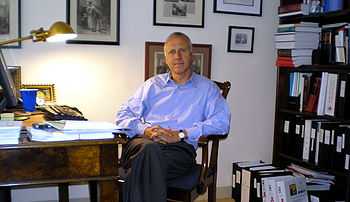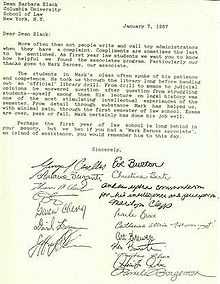Mark Barnes

Mark Barnes is a prolific[1][2] attorney and advocate. Barnes is an expert on public healthcare law. He was Director of Policy for the New York State Department of Health AIDS Institute, and Associate Commissioner for Medical and Legal Policy for the New York City Department of Health under the mayoralty of David Dinkins. He worked on the National Health Care Reform Task Force in the Clinton Administration. His work includes focus on the fields of research compliance, the ethics of clinical trials, and medical privacy. He is President-Elect of the New York State Bar Association's Health Law Section.
Personal
Barnes is a native of Dadeville, Tallapoosa County, Alabama.[3] He is the son of Elaine Robinson and Mike Barnes, and his family has lived around Tallapoosa for generations. He is a direct descendent of Daniel Boone.[4] Barnes plans to retire to Dadeville, where he purchased family property.[5] He has been with his partner since 1983.
Barnes attended Bennington College. In 1984 Barnes graduated from Yale Law School with a juris doctor and in 1991 he received his L.L.M. from Columbia University School of Law.
Legal scholarship

Barnes co-founds first ever AIDS Law Clinic
The first legal clinic addressing the AIDS crisis was begun by Barnes and Professor Deborah Greenberg at Columbia Law School to allow law students to represent persons living with AIDS in anti-discrimination cases. The program was funded in part by the U.S. Department of Education and received referrals from the New York City Commission on Human Rights and the State Division of Human Rights. The clinical education director at Columbia said of Barnes: "[He] is a leader in the field, and we're lucky to have him. He's highly knowledgeable, he's litigated on a precedented discrimination case, and he's sensitive to the AIDS crisis."[7]
Law students protest Columbia's actions over Barnes, clinic
The clinic was a success by all measure, praised by public health officials and by students as hands-on experience. But the school did not commit to its continuance. This became a controversy that made the newspapers for months. On April 12, 1989, 200 students protested Columbia Law School's attempts to close the "school's successful and much praised 'AIDS' legal clinic."[8] They held a sit-in at the law school building to demand the faculty committee renew Barnes's contract for another year. "We thought one of the reasons for him not being reappointed is the lack of support for the clinic by the university," said Maya Wiley, 3L and protest organizer.[9] Dean Barbara Black said the school supported the clinic, but declined to say why Barnes was not offered another one-year contract, due to expire June 30, 1989. Wiley retorted, "In all of our conversations with the powers-that-be at this school, it's been very clear to us that the clinic is in jeopardy and that there is a prevailing attitude among the powers-that-be opposed to the clinical approach." Another student, Matt Levine, put the students' concern more bluntly: "We do care about Mark Barnes because he has run the clinic extremely well. But the core issue is the continuation of the AIDS clinic."
On April 19, co-founder Deborah Green announced the school would keep the clinic open.[10] On June 28, 1989, the Columbia Spectator reported that Barnes was reappointed and promoted from Clinic Advisor to the Assistant Clinical Professor of Law by the faculty.[11] "I'm gratified that the clinic will continue for an additional semester, but the challenge for the Law School is going to be the continuation of the clinic after the fall semester," said Barnes.
Public service
In 1989, Barnes began working as the AIDS policy director for the New York State Department of Health. In 1992, he was appointed associate commissioner for medical and legal policy at the New York City Department of Health. He was appointed by then-Health and Human Services Secretary Donna Shalala to the new National Human Research Protections Advisory Committee, which examined issues of ethical conduct in human medical experimentation.[12] Barnes participated in the first-ever White House Conference on HIV and AIDS on December 6, 1995. He has been a consultant for the National Commission on AIDS, the Centers for Disease Control and Prevention, the American Red Cross, and the National Minority Task Force on AIDS.
Criticism
Upon selection as executive director of AIDS Action Council, Barnes's tenure with the New York department of health came under criticism by Bryan Wallace. An activist with ACT UP/Washington was quoted as saying his selection was a "commitment to mediocrity" by the AIDS community, which should have chosen a director living with AIDS. Barnes was not.[13]
Quotes

- "Simple block-granting without tough federal oversight and high standards, of Medicaid or anything else, does not serve the common good. In AIDS, and in all areas of disease control, the costs of block-granting without accountability are measured in lives needlessly shortened and lost."[14]
- "Being prolific allows you to give up credit from time to time."[15]
- "With the President's signature to the 1996 Department of Defense Authorization bill, the single most regressive AIDS measure yet passed by Congress became law, leaving in its wake a bone-crushing devastation of life and career for 1049 activity duty service members..."[16]
- "Once the administration failed [to veto the Defense Authorization bill], it is easier to see why the president--who is rumored to be furious at his own staff for this ineptitude--felt compelled to sign it. After all, his own staff had negotiated its final form."[17]
- "The federal government has a compelling humanitarian and financial interest in ensuing [sic] that all poor people with life-threatening diseases have access to quality medical care -- an interest that 50 individual states cannot be relied upon to understand and act on."[18]
Recognition
- The Best Lawyers in America (2003-2006)
- Chambers USA: America's Leading Lawyers for Business (2004-2006)
- New York Super Lawyers (2006)
References
- ↑ Barnes, Mark. Class Lecture. Medicine and the Law. Yale School of Medicine. New Haven, CT. 20 October 2010.
- ↑ Barnes, Mark. Class Lecture. Responsible Conduct of Research. Harvard School of Public Health. Boston, MA. 17 Sep 2010.
- ↑ Wylodene White, New York reader enjoys weekly column, The Dadeville Record, May 16, 1996.
- ↑ Letters to the Editor, The Pride of Tallapoosa, The New Republic, May 23, 1988; Barnes wrote, "Although I heard many tales from my great-grandfather, Jack Boone (a direct descendant of Daniel)...."
- ↑ Id.
- ↑ Kristina Campbell, Mark Barnes wants AIDS Action Council to be a "tough presence", The Washington Blade, January 6, 1994
- ↑ Tina Traster, On the Front Lines of AIDSLaw: From Discrimination to Confidentiality, There Are Few Precedents In Any Of Their Cases, West Side Spirit, October 24, 1988, Page 20.
- ↑ John Hammond, Students Demonstrate at Columbia; Protest Department of AIDS Clinic Co-Director, New York Native, May 1, 1989.
- ↑ William Douglas, Students Stage Sit-in To Aid Law Lecturer, New York Newsday, April 14, 1989.; Constance Hays, Students Protest Possible Closign of Legal Clinic, The New York Times, April 16, 1989.
- ↑ D.J. Saunders, AIDS law clinic stays, New York Daily News, April 20, 1989.
- ↑ Gerson Rothschild, Barnes reappointed to run Law School AIDS clinic, Columbia Spectator, June 28, 1989.
- ↑ New York Law Journal, Today's News: Update, January 4, 2001.
- ↑ See, above, Campbell, The Washington Blade
- ↑ Op-Ed, A Lesson in 'Pure' State Control, The Chicago Tribune, January 31, 1996. Barnes was executive director of the AIDS Action Council.
- ↑ Barnes, Mark. Class Lecture. Responsible Conduct of Research. Harvard School of Public Health. Boston, MA. 17 Sep 2010.
- ↑ Op-Ed, Bill to dismiss HIV-positive military unfair, defies Constitution, Journal of the International Association of Physicians in AIDS Care, March 1996.
- ↑ Letter to the editor, The New Republic, March 18, 1996.
- ↑ Op-Ed, Medicaid proposal spells out deadly reform, The Washington Blade, October 13, 1995.